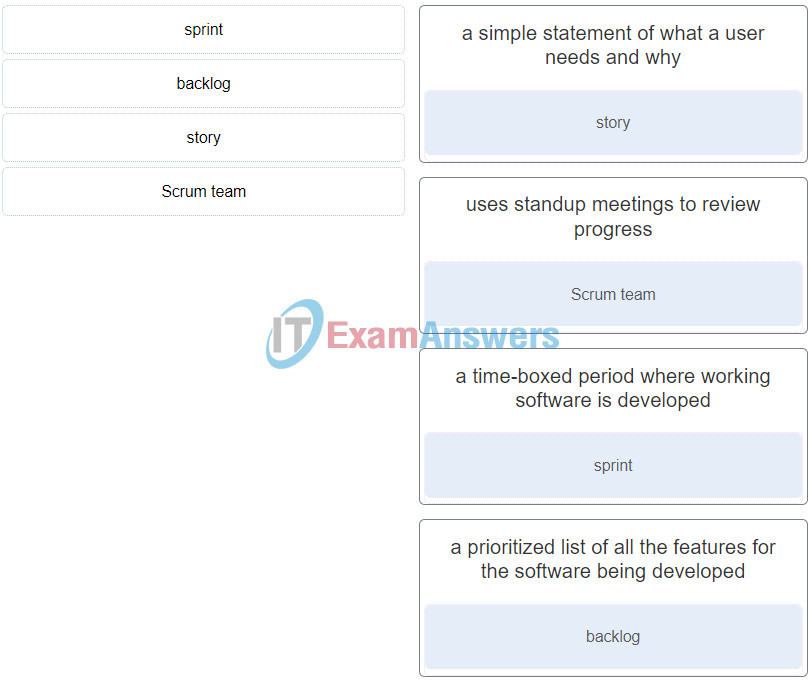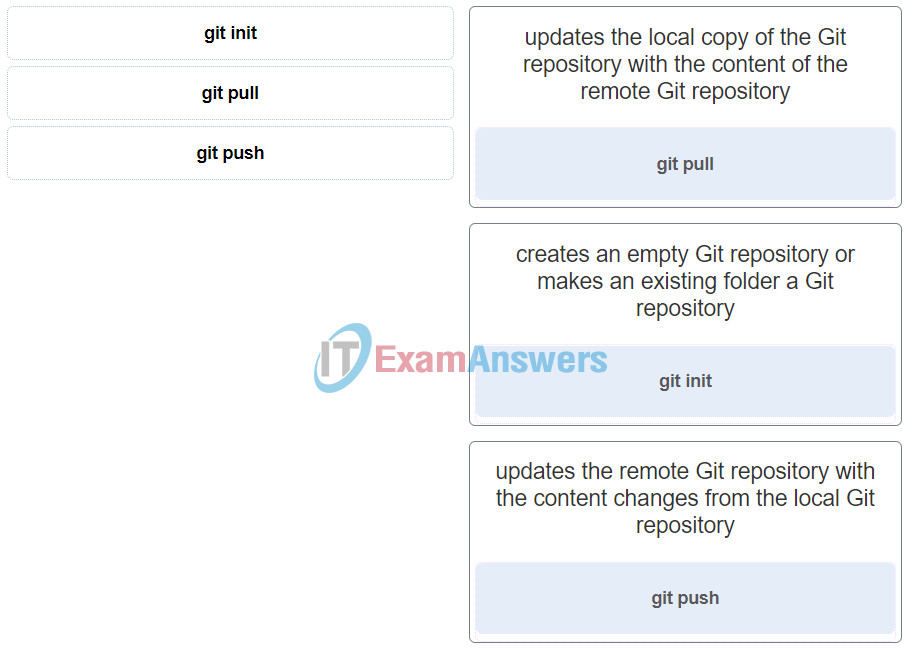Module 3: Software Development and Design Exam Answers
DevNet Associate (Version 1.0) – DevNet Associate Module 3 Exam Answers
1. A developer issues the Linux command pip3 freeze in an activated Python 3 virtual environment. What is the function that is provided by the command?
- to output a list of installed Python packages
- to lock the current virtual environment
- to prepare the environment before installing a Python package
- to deactivate the current virtual environment
2. What are two characteristics of the Git version control system? (Choose two.)
- It is a local vcs.
- It is a centralized VCS.
- It is a distributed VCS.
- It is Microsoft proprietary.
- It is Cisco proprietary.
- It is open source
3. Match the Lean term with a description.

DevNet Associate (Version 1.0) – DevNet Associate Module 3 Exam Q3
4. What characteristic describes a formal code review?
- Code is automatically sent for review by source code management systems once it is checked in.
- The entire code base is reviewed in a series of meetings.
- It utilizes a peer code review tool to identify code that needs retesting.
- It provides direct interaction between the review team and the code author.
5. Which fundamental Lean principle forms the basis from which all other Lean principles flow?
- build integrity in
- eliminate waste
- deliver as fast as possible
- amplify learning
6. When a unified diff file is being reviewed, which symbol is used to indicate that a line has been added?
- /dev/null
- @@
- +
7. What special characters are used to enclose JSON objects?
- forward slash /
- square brackets []
- curly braces {}
- parenthesis ()
8. What are two features of the formal code review? (Choose two.)
- For a quicker turnaround, it involves only one reviewer
- It involves the developer going through code with the reviewer line-by-line.
- It promotes discussion among all of the reviewers.
- It allows the developer to make changes on the spot.
- It involves a review of the entire code base in a series of meetings.
9. Which statement describes the Waterfall methodology of software development?
- Process tasks are broken up into time-boxed iterations called sprints.
- Each step in the process must be completed before the next step starts
- It emphasizes elimination of wasted effort and maximizes customer value.
- Multiple steps in the process are started simultaneously.
10. What is clean code?
- code that has no reviewer comments
- code that has passed functional testing
- code that is easy to read and understand
- code that performs a discrete task
11. Match the Git command with its function.

DevNet Associate (Version 1.0) – DevNet Associate Module 3 Exam
12. What is the role of the view component in the Model-View-Controller (MVC) flow?
- It accepts selected data and displays the visual representation to the user.
- It accepts the input and applies the required rules to format the data.
- It requests user input and manipulates it to fit the format for the model.
- It manages the data, logic and rules of the application.
13. A developer is constructing some functions in Python. When is a function referred to as a module in Python?
- when the function is declared during the execution of a Python program
- when the function is initiated during the execution of a Python program
- when the function is packaged in a single Python file
- when the function is used for the first time
14. A student is learning Python using the interactive interpreter mode. The student issues these commands:
>>> class Uri(): ... def_init__(self, host, prot): ... self.host = host ... self.prot = prot ... self.url = self.prot + "://" + self.host >>>
Which command should the student use to create an object with one attribute being a valid URL?
- >>> url2 = Url(URL, ‘http://’, ‘www.cisco.com’)
- >>> url2 = Url(‘http’, ‘://’, ‘www.cisco.com’)
- >>> url2 = Url(‘www.cisco.com’, ‘http’)
- >>> url2 = Url(‘http’, ‘www.cisco.com’)
15. A developer issues a Linux command
- to activate the Python 3 virtual environment named devenv
- to enter the Python 3 virtual environment named veny using the devnet tool sets
- to install the devnet tool sets in the Python 3 virtual environment named veny
- to create a Python 3 virtual environment named devenv
16. When a unified .diff file is being reviewed, which symbol is used to indicate that a line has been added?
@@
/dev/null
+
–

Pls explain more on this one :
Which command should the student use to create an object with one attribute being a valid URL?
if you see the args for the constructor of the class, it is first asking for hostname and protocol. so hostname will be passed first and then protocol.
6- .diff file (POINT)
What is the definition of a sprint in the Agile development model?
a statement of all customer requirements and specific timelines
a prioritized list of all the features for the software being developed
a time-boxed period where working software is developed
a team of people with different roles that work to accomplish the full SDLC
15 – python3 -m venv not veny
Fixed, thanks for report!